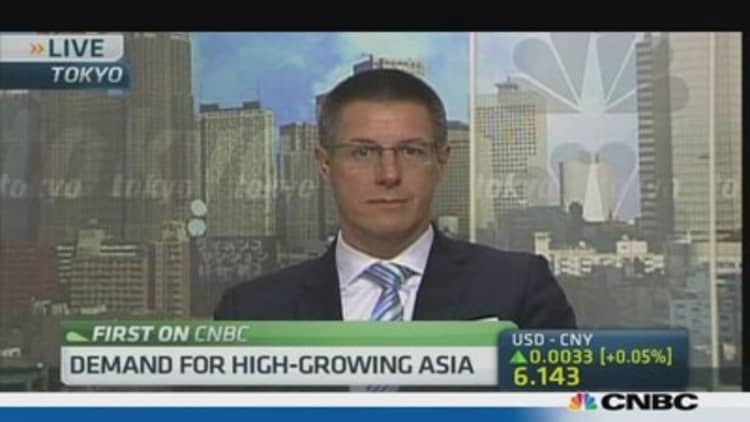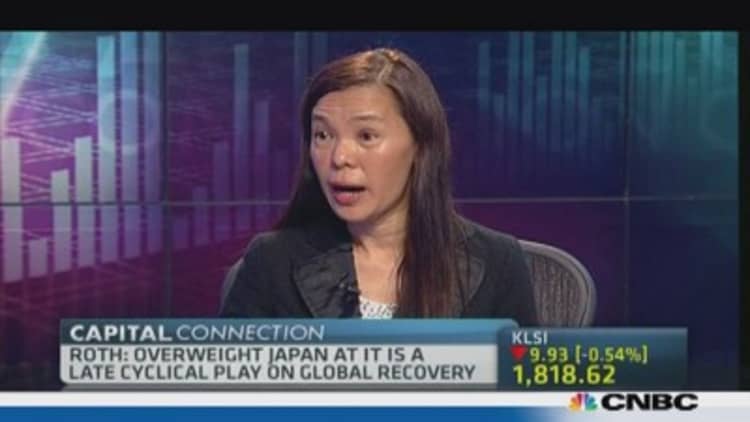
Providers of exchange traded funds, or ETFs, are wooing Japanese retail investors with opportunities to invest in foreign stocks amid expectations the market will soon see a flood of fresh funds.
"Here in Japan, it is very clear the non-domestic equity share of investments in this market is significantly lower compared to Europe or to the U.S., so there is much more need for diversification in general," said Harmut Graff, CEO of index provider Stoxx.
(Read more: Is the BOJ at its limits?)
This week, his company launched the Stoxx Asean-five Select Dividend 50 index ETF on the Tokyo Stock Exchange, in partnership with Nomura.
Graff expects a lot more demand for these sorts of products following the launch of the Nippon Individual Savings Account, or NISA, program at the beginning of the year. The accounts offer a five-year tax holiday on dividends and capital gains, provided the funds are invested in stocks, mutual funds or exchange-traded funds, with bonds not eligible for the tax breaks.

(Read more: Why Japan shares can't get fresh traction)
The Bank of Japan estimates that around 55 percent of the 1.5 quadrillion yen (around $14.6 trillion) worth of Japanese household financial assets are collecting dust in cash and deposits. The government aims to get about 25 trillion yen of that shifted to NISA accounts by 2020. If around 1 trillion yen a year flows into Japanese equities, share prices could rise by around 5.2 percent a year, Nomura said in a December report.
Mrs. Watanabe, the nickname for Japan's retail investors, could be a tough sell when it comes to foreign shares. Globally, retail investors tend to have home bias when it comes to asset allocation, but Japanese investors may be more wary than most.
(Read more: Why you should be patient with Abenomics)
A recent survey by Franklin Templeton found that within Asia, Japanese investors are the most likely to expect the best equity and fixed income returns will come from their home country, with 54 percent preferring to invest there, compared with the next-most stay-at-homers, Australia at 45 percent and China at 35 percent.
But Graff expects the dividend focus of his company's first offering in Japan will overcome some resistance, citing current low interest rates globally. Japan's 10-year government bond is currently offering around 0.64 percent interest, according to Reuters data.
His company is also considering offering thematic products, such as infrastructure investments, in addition to regional ones.
"We definitely believe there is much more possibilities for growth in this specific area," he said. "Passive (index) possibilities come along with significant lower fees compared with other alternatives for investing into the equity market," Graff added, citing significant growth in recent years.
(Read more: Hedge funds look to put strategies into ETFs to lure more investors)
ETFs are a big business. In the U.S., around $1.30 trillion was invested in ETFs as of November 2012, according to data from the Investment Company Institute. Around 4.21 trillion yen (around $41 billion) was invested in ETFs at the end of 2012, according to data from the Japan Securities Dealers Association.
Others expect Mrs. Watanabe's home bias can be overcome to an extent.
(Read more: Nikkei at 25,000? Nomura thinks so)
"Japanese investors are not particularly different from other investors," said Ed Rogers, CEO of Rogers Investment Advisors, noting many U.S. investors keeping upwards of 90 percent of their investments in their home market. "There's a sliver of the population that's always interested in international investment and diversifying away from home country risks."
Many of Japan's small and medium-sized businesses diversifying operations around the region, particularly in places such as Thailand, and investing in those countries' equities is just an extension, Rogers noted.
He expects interest in investing in ETFs will increase as Japan's multi-decade deflationary malaise may finally be coming to an end.
"If you're a retail Japanese investor and you're sitting on top of cash that's potentially wasting away, it no longer makes sense," Rogers said. "ETFs are seen as simply an easy way to get exposure to equities," he said, although he noted he doesn't believe it's the optimal investment strategy.
—By CNBC.Com's Leslie Shaffer; Follow her on Twitter @LeslieShaffer1

